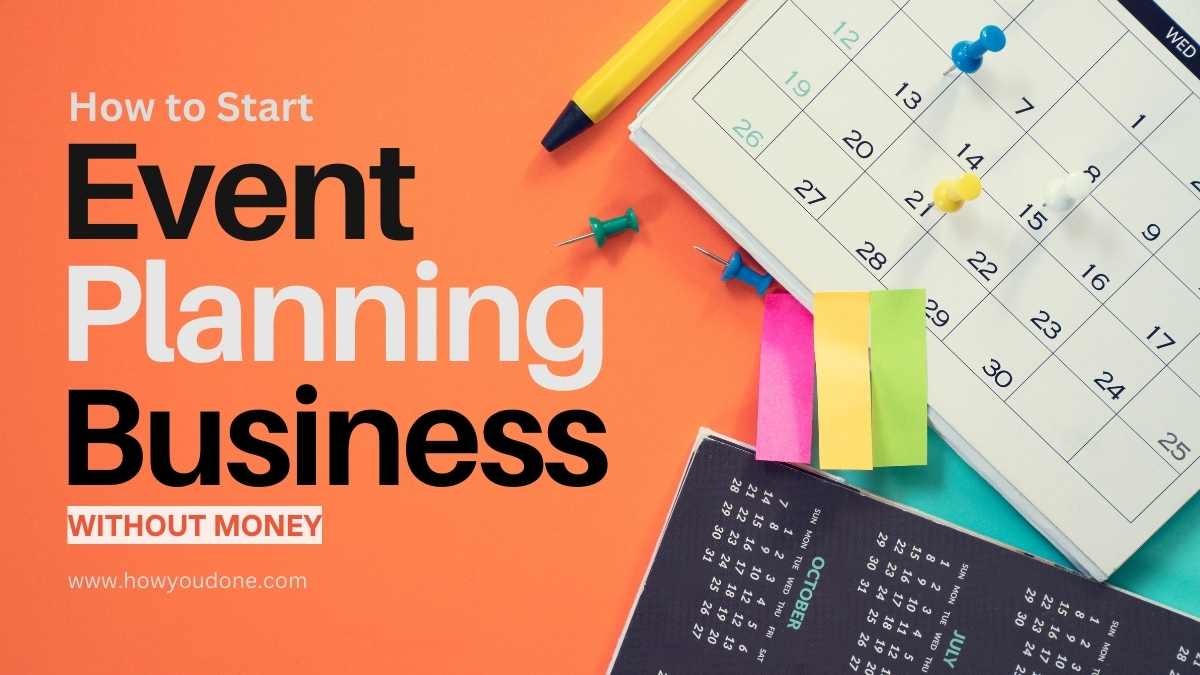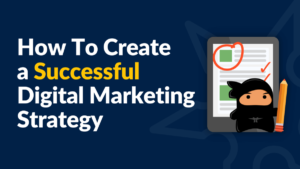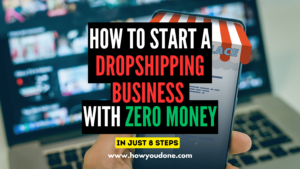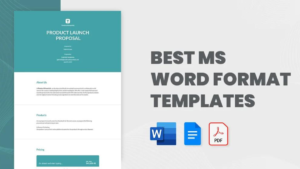Do you have a passion for organizing events and creating memorable experiences? Do you want to turn your hobby into a profitable business? If yes, then you might be wondering how to start an event planning business with no money.
The event planning industry is booming, with a projected growth rate of 8% from 2019 to 2029, according to the U.S. Bureau of Labor Statistics. This means that there is a high demand for event planners who can plan and execute various types of events, such as weddings, corporate meetings, charity fundraisers, birthday parties, and more.
However, starting an event planning business can be challenging, especially if you have no money to invest. You might think that you need a lot of capital to buy equipment, rent an office space, hire staff, and market your services. But the truth is, you can start an event planning business with zero money, as long as you have the right mindset, skills, and strategies.
In this blog, we will show you how to start an event planning business with no money in seven easy steps. We will also share some tips and resources to help you along the way. By the end of this blog, you will be ready to launch your event planning business and make your dream come true.
Chapter 1: Understanding the Event Planning Business
Before you start your event planning business, you need to understand the basics of the industry and what it takes to succeed as an event planner. Here are some key points to consider:
Defining Your Niche

One of the most important decisions you need to make is what kind of events you want to specialize in. There are many types of events, such as weddings, corporate events, charity events, social events, and more. Each type of event has its own requirements, challenges, and opportunities.
By defining your niche, you can focus on your target market, develop your expertise, and stand out from the competition. For example, if you love weddings, you can become a wedding planner and cater to couples who are looking for a unique and personalized wedding experience.
To define your niche, you need to consider your passion, skills, experience, and market demand. You can also do some research on the existing event planners in your area and see what kind of events they offer and how they position themselves.
Market Research

Once you have defined your niche, you need to do some market research to validate your idea and understand your potential customers. Market research will help you answer questions such as:
– Who are your ideal clients and what are their needs, preferences, and pain points?
– How big is the market and how much are they willing to pay for your services?
– Who are your competitors and what are their strengths and weaknesses?
– How can you differentiate yourself from your competitors and create a unique value proposition?
To conduct market research, you can use various methods, such as:
– Online surveys: You can create and distribute online surveys using free tools like Google Forms or SurveyMonkey to collect feedback from your target audience.
– Interviews: You can conduct one-on-one interviews with potential clients, vendors, or industry experts to gain deeper insights into their opinions and expectations.
– Observation: You can attend events similar to your niche and observe how they are planned, executed, and received by the attendees.
– Secondary research: You can also use secondary sources of information, such as industry reports, articles, blogs, podcasts, and social media, to learn more about the trends, best practices, and challenges in the event planning industry.
Skills and Knowledge

Another essential aspect of understanding the event planning business is acquiring the skills and knowledge that are required for the job. Event planning is a complex and dynamic profession that involves a lot of creativity, organization, communication, problem-solving, and negotiation skills.
Some of the skills and knowledge that you need to master as an event planner are:
– Event design: You need to know how to create a theme, concept, and vision for an event, as well as how to select the appropriate venue, decor, catering, entertainment, and other elements that suit the event’s purpose and budget.
– Event management: You need to know how to plan, coordinate, and execute an event from start to finish, as well as how to handle any issues or emergencies that may arise during the event.
– Event marketing: You need to know how to promote your event and your services to your target audience, as well as how to measure the success and impact of your event.
– Event budgeting: You need to know how to estimate the costs and revenues of an event, as well as how to track and manage your expenses and income.
– Event contracts and legalities: You need to know how to negotiate and draft contracts with your clients, vendors, and venues, as well as how to comply with the laws and regulations that apply to your event.
The good news is, that you don’t need to spend a lot of money to acquire these skills and knowledge. There are many free and low-cost ways to learn and improve your event planning skills, such as:
– Online courses: You can enroll in online courses that teach you the fundamentals and advanced techniques of event planning. Some of the popular platforms that offer free or affordable courses are Coursera, Udemy, Skillshare, and Eventbrite Academy.
– Volunteering: You can volunteer for local organizations, charities, or events that need help with planning and organizing their events. This will give you hands-on experience and exposure to different types of events and challenges.
– Mentoring: You can seek guidance and advice from experienced event planners who are willing to share their knowledge and expertise with you. You can find mentors through online platforms like SCORE Event Planner Association, or your personal and professional network.
Also, read how to do a career transition into software engineer
Building a Foundation with No Funds
After you have understood the event planning business, you need to build a solid foundation for your business. This involves creating a business plan, choosing a legal structure and name, and branding your business. Here are some tips on how to do these tasks without spending any money:

Business Planning
A business plan is a document that outlines your vision, goals, and strategies for your event planning business. It helps you to clarify your idea, identify your target market, analyze your competition, and plan your finances. It also serves as a roadmap and a tool to measure your progress and performance.
To create a business plan, you can use free templates and guides that are available online, such as the ones provided by the U.S. Small Business Administration or Bplans. You can also use free online tools like LivePlan or Bizplan to help you create and manage your business plan.
Your business plan should include the following sections:
– Executive summary: A brief overview of your business idea, mission, vision, goals, and value proposition.
– Company description: A detailed description of your business, including your niche, services, target market, competitive advantage, and legal structure.
– Market analysis: A comprehensive analysis of your industry, market, and competition, as well as the opportunities and threats that you face.
– Marketing and sales plan: A description of your marketing and sales strategies, such as your pricing, promotion, distribution, and customer service methods.
– Financial plan: A projection of your income statement, balance sheet, cash flow statement, and break-even analysis, as well as your funding needs and sources.
– Appendix: Any additional information or documents that support your business plan, such as resumes, contracts, licenses, permits, etc.
Legal Structure and Name

Another important step in building your foundation is choosing a legal structure and a name for your business. Your legal structure determines how your business is taxed, regulated, and liable, as well as how you can raise funds and distribute profits. Your business name is the identity of your business and how you communicate with your customers and stakeholders.
The most common legal structures for event planning businesses are:
– Sole proprietorship: This is the simplest and most common legal structure for small businesses. It means that you are the sole owner and operator of your business, and you are personally responsible for all aspects of your business, including debts and liabilities. You don’t need to register your business with the state, but you may need to obtain a business license or permit depending on your location and type of event. You also need to report your business income and expenses on your personal tax return.
– Partnership: This is a legal structure where two or more people agree to share the ownership and operation of a business. You can choose between a general partnership, where all the partners have equal rights and responsibilities, or a limited partnership, where one or more partners have limited liability and involvement. You need to register your partnership with the state and create a partnership agreement that outlines the terms and conditions of your partnership. You also need to file a separate tax return for your partnership, but the profits and losses are passed through to the partners’ tax returns.
– Limited liability company (LLC): This is a legal structure that combines the benefits of a sole proprietorship or partnership and a corporation. It means that you can operate your business as a separate entity from yourself, and you are not personally liable for the debts and obligations of your business. You also have more flexibility and simplicity in managing and taxing your business. You need to register your LLC with the state and pay a filing fee, which varies depending on your location. You also need to create an operating agreement that defines the rules and regulations of your LLC. You can choose to be taxed as a sole proprietorship, a partnership, or a corporation, depending on your preferences and circumstances.
Choosing a legal structure for your business depends on your goals, preferences, and risks. You should consult a lawyer or an accountant before making a decision, as each legal structure has its advantages and disadvantages.
After you have chosen a legal structure for your business, you need to choose a name for your business. Your business name should reflect your niche, services, and personality, as well as be catchy, memorable, and easy to spell and pronounce. You also need to make sure that your business name is not already taken by another business, trademark, or domain name.
To choose a name for your business, you can use free online tools like Business Name Generator or NameMesh to generate and check the availability of potential names. You can also use free online tools like the Trademark Electronic Search System or Namechk to check if your name is already registered or trademarked by someone else.
Once you have decided on a name for your business, you need to register it with the state and the local authorities, depending on your legal structure and location. You may also need to obtain a federal tax identification number (EIN) from the IRS, which is free and easy to do online.
Branding on a Budget

Branding is the process of creating a unique identity and image for your business that distinguishes you from your competitors and attracts your ideal customers. Branding involves elements such as your logo, color scheme, font, slogan, and tone of voice.
Branding is important for your event planning business because it helps you to:
– Communicate your value proposition and personality to your target audience.
– Build trust and credibility with your potential and existing clients.
– Create a memorable and consistent impression across all your touchpoints.
– Stand out from the crowd and differentiate yourself from your competitors.
To create a brand for your business, you don’t need to hire a professional designer or spend a lot of money. You can use free online tools like Canva or LogoMaker to design your own logo and branding materials, such as business cards, flyers, brochures, etc. You can also use free online tools like Coolors or Adobe Color to choose a color palette that suits your brand.
When creating your brand, you should consider the following tips:
– Keep it simple and clear: Your logo and branding materials should be easy to recognize and understand, without too much clutter or complexity.
– Make it relevant and appealing: Your logo and branding materials should reflect your niche, services, and personality, as well as appeal to your target audience’s emotions and preferences.
– Be consistent and coherent: Your logo and branding materials should match and complement each other, as well as be consistent across all your platforms and channels.
Chapter 3: Digital Presence and Marketing Without Money
The next step in starting your event planning business with no money is creating a digital presence and marketing your business online. This means that you need to have a website, social media accounts, and content that showcase your work and attract your ideal clients. Here are some ways to do this without spending any money:
Website Creation

A website is a must-have for any event planning business, as it serves as your online portfolio, brochure, and storefront. A website allows you to:
– Display your previous and current projects, testimonials, and awards.
– Explain your services, packages, and pricing.
– Provide your contact information and booking options.
– Educate your visitors about your niche, industry, and expertise.
– Generate leads and conversions for your business.
To create a website for your event planning business, you don’t need to hire a web developer or pay for a hosting service. You can use free platforms like WordPress or Wix to build your website using their templates, features, and tools. You can also use free domains like .wordpress.com or .wixsite.com, or buy a cheap domain name from providers like GoDaddy or Namecheap.
When creating your website, you should consider the following tips:
– Choose a design that matches your brand and niche: Your website should reflect your brand identity and personality, as well as your niche and services. You should choose a template, color scheme, font, and layout that suit your style and preferences.
– Optimize your website for SEO: SEO stands for search engine optimization, which is the process of improving your website’s visibility and ranking on search engines like Google or Bing. You should use keywords, titles, headings, meta descriptions, and images that are relevant to your niche and target audience. You should also use free tools like Google Analytics or Google Search Console to monitor and improve your website’s performance and traffic.
– Update your website regularly: Your website should be up-to-date and fresh, with new and relevant content and information. You should add new projects, testimonials, and blog posts to your website, as well as update your services, packages, and pricing. You should also check your website for any errors, broken links, or slow loading times.
Social Media Strategy
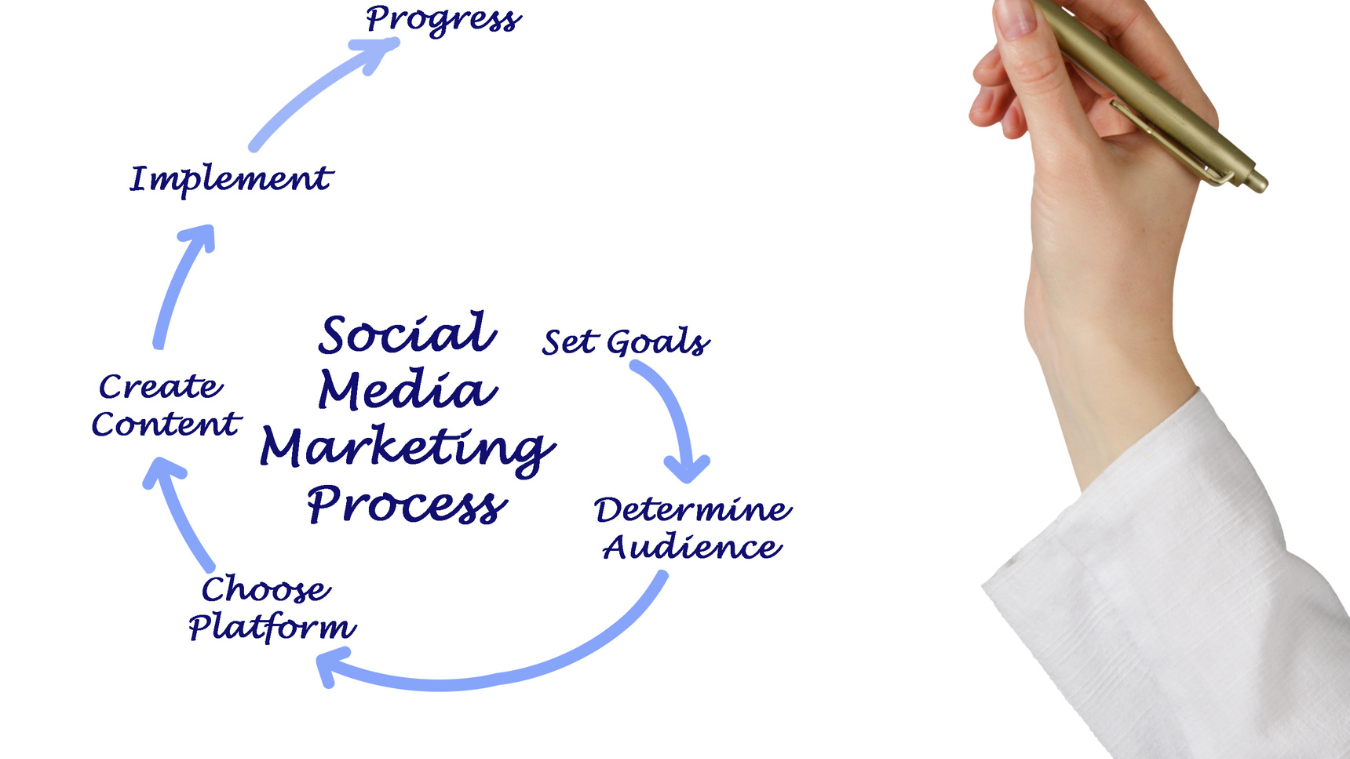
Social media is another powerful tool for creating a digital presence and marketing your event planning business online. Social media allows you to:
– Connect and engage with your target audience and potential clients.
– Showcase your work and share your stories and insights.
– Build your reputation and credibility as an event planner.
– Increase your exposure and reach to new and wider markets.
To use social media for your event planning business, you don’t need to pay for any ads or promotions. You can use free platforms like Instagram, Facebook, LinkedIn, and Pinterest to create and share content that showcases your work and personality. You can also use free tools like Buffer or Hootsuite to schedule and manage your posts across different platforms.
When using social media for your event planning business, you should consider the following tips:
– Choose the right platforms for your niche and audience: You don’t need to be on every social media platform, but you should focus on the ones that are most relevant and effective for your niche and audience. For example, if you are a wedding planner, you might want to use Instagram and Pinterest to showcase your visual and creative work, while if you are a corporate event planner, you might want to use LinkedIn and Facebook to network and communicate with your professional clients.
– Create and share valuable and engaging content: Your social media content should be valuable and engaging for your audience, as well as consistent with your brand and niche. You should create and share content that showcases your work, such as photos, videos, or stories of your events, as well as content that educates, entertains, or inspires your audience, such as tips, trends, or testimonials. You should also interact with your followers, by responding to their comments, questions, and messages, as well as liking, sharing, or commenting on their posts.
– Use hashtags and tags to increase your visibility and reach: Hashtags and tags are keywords or phrases that help your content to be found and seen by more people on social media. You should use hashtags and tags that are relevant to your niche, industry, and location, as well as popular and trending ones. You should also tag your clients, vendors, and venues, as well as influencers or celebrities that are related to your niche or event.
Content Marketing

Content marketing is another way to create a digital presence and market your event planning business online. Content marketing is the process of creating and distributing valuable, relevant, and consistent content to attract and retain your target audience and drive them to take action. Content marketing allows you to:
– Establish your authority and expertise as an event planner.
– Educate and inform your audience about your niche, industry, and services.
– Provide value and solutions to your audience’s problems and needs.
– Build trust and loyalty with your audience and potential clients.
To create content for your event planning business, you don’t need to pay for any writers or editors. You can use your knowledge, experience, and skills to create content that showcases your work and personality. You can also use free online tools like Grammarly or Hemingway to check and improve your writing.
Some of the types of content that you can create for your event planning business are:
– Blogs: Blogs are articles that you write and publish on your website or other platforms, such as Medium or LinkedIn. Blogs allow you to share your stories, insights, and opinions on topics related to your niche and industry. You can write blogs that showcase your work, such as case studies, behind-the-scenes, or testimonials, as well as blogs that educate your audience, such as tips, trends, or how-tos.
– Videos: Videos are visual and audio content that you create and upload on platforms like YouTube or Vimeo. Videos allow you to show your work and personality more dynamically and engagingly. You can create videos that showcase your work, such as event highlights, testimonials, or interviews, as well as videos that educate your audience, such as tutorials, webinars, or Q&A sessions.
– Podcasts: Podcasts are audio content that you create and distribute on platforms like Spotify or Apple Podcasts. Podcasts allow you to share your voice and opinions on topics related to your niche and industry. You can create podcasts that showcase your work, such as event stories, testimonials, or interviews, as well as podcasts that educate your audience, such as tips, trends, or advice.
When creating content for your event planning business, you should consider the following tips:
– Know your audience and their needs: Your content should be tailored to your target audience and their needs, preferences, and pain points. You should know who your audience is, what they want, and what they care about, and create content that addresses their questions, challenges, and goals.
– Provide value and quality: Your content should provide value and quality to your audience, as well as be consistent with your brand and niche. You should create content that is useful, informative, entertaining, or inspiring, as well as original, authentic, and accurate. You should also avoid spamming, plagiarizing, or misleading your audience with your content.
– Optimize your content for SEO and social media: Your content should be optimized for SEO and social media so that it can be found and seen by more people on search engines and social media. You should use keywords, titles, headings, meta descriptions, and images that are relevant to your niche and audience. You should also use hashtags, tags, and links to increase your visibility and reach on social media platforms.
Chapter 4: Portfolio Building and Networking
The fourth step in starting your event planning business with no money is building a portfolio and networking with other people in the industry. A portfolio is a collection of your work and achievements that showcases your skills and experience as an event planner. Networking is the process of connecting and building relationships with other people who can help you grow your business, such as clients, vendors, venues, and influencers. Here are some ways to build your portfolio and network without spending any money:
Starting Without a Portfolio

One of the biggest challenges of starting an event planning business with no money is having no portfolio to show to your potential clients. A portfolio is essential for proving your credibility and quality as an event planner, as well as attracting and convincing your ideal clients to hire you.
However, you don’t need to have a lot of money or experience to start building your portfolio. There are many ways to gain experience and showcase your work from scratch, such as:
– Organizing free community events: You can offer to organize free events for your local community, such as festivals, fairs, markets, or fundraisers. This will allow you to practice your event planning skills, as well as demonstrate your social responsibility and goodwill.
– Volunteering for existing events: You can volunteer for organizations, charities, or events that need help with planning and organizing their events. This will give you exposure and experience to different types of events and challenges, as well as a chance to learn from other event planners and professionals.
– Offering services at a reduced rate: You can offer your services at a reduced rate or for free to your friends, family, or acquaintances who are looking for an event planner. This will give you a chance to build your portfolio and testimonials, as well as generate word-of-mouth referrals and recommendations.
When starting without a portfolio, you should consider the following tips:
– Choose events that match your niche and goals: You should choose events that match your niche and goals, as well as your skills and resources. You should avoid events that are too big, complex, or risky for your level of experience and budget. You should also avoid events that are not relevant or beneficial for your target market and brand.
– Document and showcase your work: You should document and showcase your work professionally and attractively. You should take photos, videos, or testimonials of your events, as well as collect feedback and data on the success and impact of your events. You should also update your website, social media, and content with your work and achievements.
– Ask for referrals and reviews: You should ask for referrals and reviews from your clients, vendors, and venues, as well as from your friends, family, or acquaintances. You should also thank them for their support and appreciation. Referrals and reviews are powerful ways to build your reputation and credibility, as well as to attract and convert new clients.
Networking

Networking is another crucial step in starting your event planning business with no money. Networking is the process of connecting and building relationships with other people who can help you grow your business, such as clients, vendors, venues, and influencers. Networking allows you to:
– Learn and improve your skills and knowledge: Networking can help you learn and improve your skills and knowledge as an event planner, by exposing you to new ideas, trends, and best practices. You can also get feedback, advice, and guidance from other event planners and professionals.
– Find and access opportunities and resources: Networking can help you find and access opportunities and resources for your event planning business, such as leads, referrals, partnerships, collaborations, or discounts. You can also get access to exclusive or preferred venues, vendors, or events.
– Increase your exposure and reach: Networking can help you increase your exposure and reach to your target market and audience, as well as to new and wider markets. You can also get endorsements, recommendations, or mentions from other influential people in the industry.
To network for your event planning business, you don’t need to pay for any memberships or fees. You can use free and low-cost ways to network with other people in the industry, such as:
– Attending free business events: You can attend free business events, such as workshops, seminars, webinars, or meetups, that are related to your niche and industry. You can also attend free events that are organized by your local chamber of commerce, business association, or community center. These events are great opportunities to meet and interact with other event planners, vendors, venues, and potential clients.
– Joining online forums and groups: You can join online forums and groups, such as Facebook groups, LinkedIn groups, Reddit forums, or Quora spaces, that are related to your niche and industry. You can also join online platforms like the Event Planner Association or Eventbrite Community, which are dedicated to event planners and professionals. These forums and groups are great places to share your work, ask questions, answer questions, and engage with other people in the industry.
– Using social media: You can use social media to network with other people in the industry, by following, liking, commenting, or sharing their posts. You can also use social media to reach out to them directly, by sending them a message, a compliment, or an invitation. You can also use social media to join or create live events, such as Instagram Live, Facebook Live, or Clubhouse, where you can interact with other event planners and professionals in real-time.
When networking for your event planning business, you should consider the following tips:
– Be genuine and respectful: You should be genuine and respectful when networking with other people in the industry. You should avoid being pushy, spammy, or salesy, and instead focus on building trust and rapport. You should also respect their time, privacy, and boundaries, and avoid being intrusive or annoying.
– Be helpful and valuable: You should be helpful and valuable when networking with other people in the industry. You should offer your help, support, or advice, as well as share your resources, insights, or opportunities. You should also provide value and solutions to their problems and needs, and show them how you can benefit them or their business.
– Follow up and stay in touch: You should follow up and stay in touch with the people you network with, by sending them a thank you note, a feedback request, or a reminder. You should also keep them updated on your work and achievements, as well as on any relevant news or events. You should also maintain and nurture your relationships with them, by showing your appreciation, interest, and care.
Chapter 5: Operations and Management with Minimal Costs
The fifth step in starting your event planning business with no money is operating and managing your business with minimal costs. This means that you need to set up an efficient home office space, use free tools and software, and manage your time effectively. Here are some ways to do this without spending any money:
Home Office

A home office is a space in your home where you can work on your event planning business. A home office allows you to:
– Save money on rent, utilities, and transportation.
– Have more flexibility and convenience in your work schedule and environment.
– Have more privacy and security for your work and data.
To set up a home office for your event planning business, you don’t need to buy any furniture or equipment. You can use what you already have in your home, or borrow or rent from your friends, family, or neighbors. You can also use free or low-cost services, such as libraries, cafes, or coworking spaces, to access the internet, printers, or meeting rooms.
When setting up your home office, you should consider the following tips:
– Choose a comfortable and quiet space: You should choose a comfortable and quiet space in your home, where you can work without any distractions or interruptions. You should also choose a space that has enough lighting, ventilation, and temperature. You should avoid working in your bedroom, living room, or kitchen, as they can affect your productivity, health, and work-life balance.
– Organize your space and equipment: You should organize your space and equipment so that you can work efficiently and effectively. You should have a desk, a chair, a computer, a phone, and a printer, as well as any other equipment that you need for your event planning business. You should also have a filing system, a calendar, a planner, and a notebook, as well as any other supplies that you need for your event planning business. You should also keep your space and equipment clean and tidy, and store them properly when not in use.
– Decorate your space and personalize it: You should decorate your space and personalize it, so that you can work creatively and happily. You should add some colors, plants, pictures, or posters, as well as any other items that inspire you or reflect your brand and personality. You should also add some music, candles, or aromatherapy, as well as any other items that relax you or enhance your mood.
Free Tools and Software
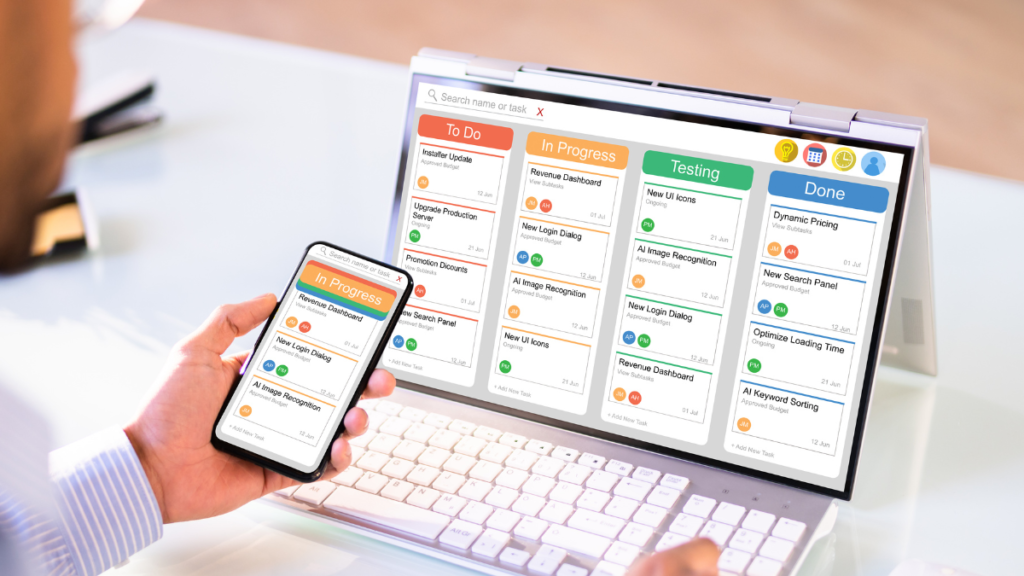
Free tools and software are applications or programs that you can use for your event planning business, without paying any fees or subscriptions. Free tools and software allow you to:
– Save money on software licenses, updates, and maintenance.
– Access and use various features and functions that are useful and relevant for your event planning business.
– Work and collaborate with your clients, vendors, and venues, as well as with your team or freelancers, if you have any.
Some of the free tools and software that you can use for your event planning business are:
– Project management tools: Project management tools help you to plan, organize, and execute your event planning projects, as well as to track and manage your tasks, deadlines, and progress. Some of the free project management tools that you can use are Asana, Trello, or Basecamp.
– Invoicing and accounting tools: Invoicing and accounting tools help you to create and send invoices to your clients, as well as to record and manage your income and expenses. Some of the free invoicing and accounting tools that you can use are Wave, FreshBooks, or Zoho Invoice.
– Communication and collaboration tools: Communication and collaboration tools help you to communicate and collaborate with your clients, vendors, and venues, as well as with your team or freelancers, if you have any. Some of the free communication and collaboration tools that you can use are Zoom, Skype, or Slack.
– Design and editing tools: Design and editing tools help you to design and edit your logo, branding materials, website, social media posts, and content. Some of the free design and editing tools that you can use are Canva, LogoMaker, or Pixlr.
Time Management

Time management is the process of planning and controlling how you spend your time on your event planning business. Time management allows you to:
– Work efficiently and effectively on your event planning projects, as well as on your other tasks and responsibilities.
– Meet your deadlines and deliver your work on time and with quality.
– Balance your work and personal life, as well as avoid stress and burnout.
To manage your time for your event planning business, you don’t need to buy any planners or timers. You can use free online tools like Google Calendar, Todoist, or Pomodoro Timer to plan and schedule your time, as well as to track and monitor your productivity.
When managing your time for your event planning business, you should consider the following tips:
– Prioritize and delegate: You should prioritize and delegate your tasks, according to their importance and urgency. You should focus on the tasks that are most important and urgent for your event planning business, and delegate or outsource the tasks that are less important or urgent, or that you are not good at or enjoy doing.
– Set goals and deadlines: You should set goals and deadlines for your event planning projects, as well as for your other tasks and responsibilities. You should make your goals and deadlines SMART, which stands for Specific, Measurable, Achievable, Relevant, and Time-bound. You should also break down your goals and deadlines into smaller and manageable steps or milestones.
– Avoid distractions and interruptions: You should avoid distractions and interruptions that can affect your concentration and performance, such as phone calls, emails, social media, or noise. You should also set boundaries and expectations with your clients, vendors, venues, and family and friends, and let them know when you are available and when you are not.
Chapter 6: Finding Clients and Making Money
The sixth step in starting your event planning business with no money is finding clients and making money. This means that you need to market and sell your services, as well as to deliver your work and get paid. Here are some ways to do this without spending any money:
Referral Programs
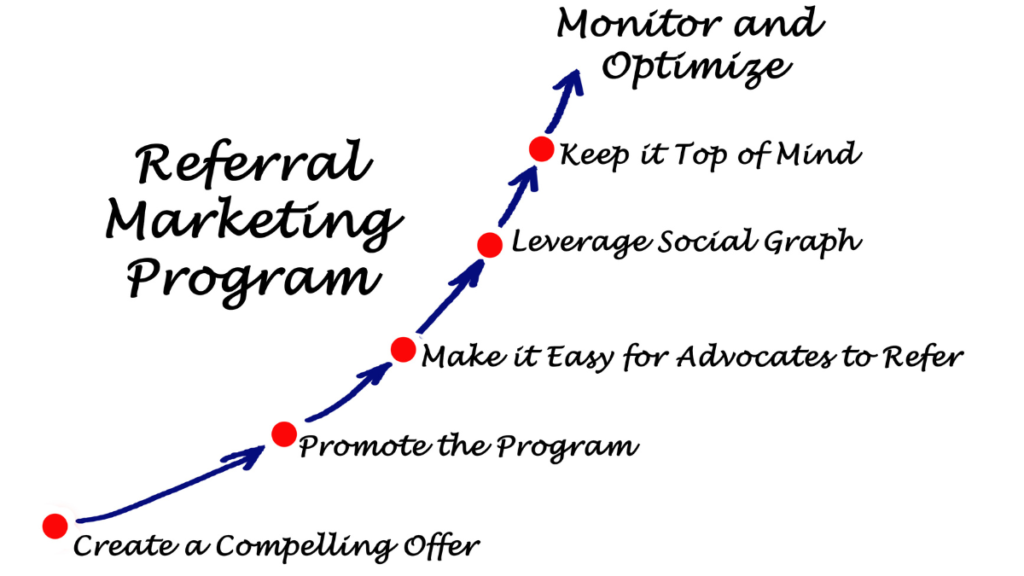
A referral program is a system where you reward your past or existing clients for referring new clients to your event planning business. A referral program allows you to:
– Generate more leads and conversions for your event planning business, as referrals are more likely to trust and hire you, based on the recommendation of someone they know and trust.
– Increase your customer loyalty and retention, as referrals are more likely to be satisfied and loyal to your event planning business, as well as to refer more clients to you in the future.
– Save money on marketing and advertising, as referrals are a free and organic way of promoting your event planning business.
To create a referral program for your event planning business, you don’t need to pay for any software or platforms. You can use free online tools like ReferralCandy, InviteReferrals, or Viral Loops to create and manage your referral program.
Here check more about how to start a consulting business with zero money
When creating a referral program for your event planning business, you should consider the following tips:
– Choose a reward that is attractive and relevant: You should choose a reward that is attractive and relevant for your clients and referrals, as well as for your event planning business. You can offer a discount, a free service, a gift card, or a cash reward, depending on your preferences and budget. You should also make sure that your reward is easy to claim and deliver, and that it does not affect your profit margin or quality.
– Communicate and promote your referral program: You should communicate and promote your referral program to your clients and referrals, as well as to your potential and existing audience. You should explain the benefits and rules of your referral program, as well as how to join and participate. You should also use your website, social media, and content to spread the word and encourage more referrals.
– Track and measure your referral program: You should track and measure your referral program, to see how it is performing and impacting your event planning business. You should monitor and analyze the number of referrals, conversions, and revenue that your referral program generates, as well as the feedback and satisfaction of your clients and referrals. You should also use this data to improve and optimize your referral program, as well as to reward and thank your clients and referrals.
Free Advertising

Free advertising is a way of promoting your event planning business without paying for any ads or promotions. Free advertising allows you to:
– Increase your exposure and reach to your target market and audience, as well as to new and wider markets.
– Build your reputation and credibility as an event planner, as well as showcase your work and personality.
– Generate more leads and conversions for your event planning business, as free advertising can attract and persuade more people to hire you.
Some of the ways to advertise your event planning business for free are:
– Classified ads: Classified ads are short and simple ads that you can post on online platforms like Craigslist, Gumtree, or OLX, or on local newspapers or magazines. Classified ads allow you to list your services, prices, and contact information, as well as to target your local market and audience.
– Online event directories: Online event directories are websites or apps that list and feature various types of events and event planners, such as Eventful, Eventbrite, or The Bash. Online event directories allow you to create and update your profile, as well as to showcase your work and reviews and connect and communicate with your potential clients.
– Community boards: Community boards are physical or online boards that display notices, flyers, or posters about events or services, such as at libraries, cafes, or schools, or on Facebook groups, Reddit forums, or Quora spaces. Community boards allow you to reach out and appeal to your local community and audience, as well as to show your social responsibility and goodwill.
When advertising your event planning business for free, you should consider the following tips:
– Choose the right platforms and channels: You should choose the right platforms and channels for your free advertising, based on your niche, market, and audience. You should also choose the platforms and channels that are popular and effective for your event planning business, as well as the ones that you can manage and update regularly.
– Create and share compelling and consistent ads: You should create and share compelling and consistent ads for your free advertising, that showcase your value proposition and personality, as well as your niche and services. You should also use keywords, titles, images, and calls to action that are relevant and appealing to your target market and audience. You should also make sure that your ads are clear, accurate, and up-to-date, and that they match and complement your brand and website.
– Follow the rules and etiquette: You should follow the rules and etiquette of the platforms and channels that you use for your free advertising, as well as of the industry and community. You should avoid spamming, scamming, or misleading your potential and existing clients, and instead focus on providing value and quality. You should also respect the privacy and preferences of your potential and existing clients, and avoid being intrusive or annoying.
Pitching Your Services

Pitching your services is the process of presenting and selling your event planning services to your potential clients. Pitching your services allows you to:
– Introduce yourself and your event planning business to your potential clients, as well as establish rapport and trust with them.
– Explain your value proposition and benefits to your potential clients, as well as address their needs, preferences, and pain points.
– Persuade your potential clients to hire you for their event planning project, as well as to negotiate and close the deal.
To pitch your services to your potential clients, you don’t need to pay for any presentations or proposals. You can use free online tools like Google Slides, PowerPoint, or Prezi to create and deliver your pitch, as well as to share and collaborate with your potential clients.
When pitching your services to your potential clients, you should consider the following tips:
– Research and understand your potential clients: You should research and understand your potential clients, before and during your pitch. You should know who they are, what they want, and what they care about, as well as their budget, timeline, and expectations. You should also ask them questions, listen to their answers, and show empathy and interest.
– Customize and tailor your pitch: You should customize and tailor your pitch, according to your potential clients and their event planning project. You should highlight your niche, expertise, and experience, as well as your previous and relevant projects, testimonials, and awards. You should also showcase your work and personality, as well as your creativity and innovation.
– Focus on the benefits and solutions: You should focus on the benefits and solutions that you can provide to your potential clients, rather than on the features and details of your event planning services. You should explain how you can help them achieve their goals and vision for their event, as well as how you can solve their problems and challenges. You should also show them the value and return on investment that they can get from hiring you, as well as the risks and costs that they can avoid by not hiring you.
– Include a call to action and a follow-up: You should include a call to action and a follow-up in your pitch, to motivate your potential clients to take the next step and to stay in touch with them. You should ask them to sign a contract, make a deposit, or schedule a meeting, depending on the stage and situation of your pitch. You should also send them a thank you note, a reminder, or a feedback request, depending on the outcome and feedback of your pitch.
Chapter 7: Scaling Up Without Breaking the Bank
The final step in starting your event planning business with no money is scaling up your business without breaking the bank. This means that you need to reinvest your profits, outsource your tasks, and seek funding for your business. Here are some ways to do this without spending any money:
Reinvesting Profits

Reinvesting profits is the process of using your earnings from your event planning business to grow and improve your business. Reinvesting profits allows you to:
– Increase your income and profit margin, as well as your cash flow and financial stability.
– Enhance your skills and knowledge, as well as your quality and efficiency.
– Expand your market and audience, as well as your exposure and reach.
To reinvest your profits for your event planning business, you don’t need to spend all or most of your money. You can use a portion of your money to reinvest in your business and save or invest the rest for your personal or emergency needs. You can also use free or low-cost ways to reinvest in your business, such as:
– Education and training: You can use your money to enroll in online courses, workshops, seminars, or certifications that can help you learn and improve your event planning skills and knowledge. You can also use free or low-cost resources, such as books, podcasts, blogs, or mentors, to keep yourself updated and informed on the latest trends and best practices in the event planning industry.
– Equipment and software: You can use your money to buy or upgrade your equipment and software that can help you work more efficiently and effectively on your event planning projects. You can also use free or low-cost tools and software, such as the ones mentioned in the previous chapter, to access and use various features and functions that are useful and relevant for your event planning business.
– Marketing and advertising: You can use your money to invest in paid marketing and advertising campaigns that can help you promote and sell your event planning services to your target market and audience. You can also use free or low-cost ways to market and advertise your event planning business, such as the ones mentioned in the previous chapter, to increase your exposure and reach to new and wider markets.
Outsourcing on a Budget

Outsourcing is the process of hiring or contracting other people or companies to do some of your tasks or responsibilities for your event planning business. Outsourcing allows you to:
– Save time and money, as well as your energy and resources.
– Focus on your core and strategic tasks and responsibilities, as well as on your strengths and passions.
– Access and leverage the skills and expertise of other people or companies, as well as their quality and efficiency.
To outsource your tasks or responsibilities for your event planning business, you don’t need to pay a lot of money or hire a lot of people or companies. You can use free or low-cost platforms like Upwork, Fiverr, or Freelancer to find and hire freelancers or part-time help for your event planning business. You can also use free or low-cost services, such as libraries, cafes, or coworking spaces, to access the internet, printers, or meeting rooms.
Some of the tasks or responsibilities that you can outsource for your event planning business are:
– Administrative tasks: Administrative tasks are tasks that are related to the day-to-day operations and management of your event planning business, such as bookkeeping, invoicing, scheduling, or customer service. You can outsource these tasks to a virtual assistant, a bookkeeper, or a customer service representative, who can handle these tasks for you remotely and efficiently.
– Creative tasks: Creative tasks are tasks that are related to the design and editing of your logo, branding materials, website, social media posts, and content. You can outsource these tasks to a graphic designer, a web developer, or a content writer, who can create and edit these materials for you professionally and attractively.
– Technical tasks: Technical tasks are tasks that are related to the technical aspects and requirements of your event planning projects, such as lighting, sound, or video. You can outsource these tasks to a technician, an engineer, or a videographer, who can set up and operate these equipment and systems for you safely and effectively.
When outsourcing your tasks or responsibilities for your event planning business, you should consider the following tips:
– Choose the right tasks and people: You should choose the right tasks and people to outsource for your event planning business, based on your goals, preferences, and budget. You should outsource the tasks that are not your core or strategic tasks, or that you are not good at or enjoy doing. You should also choose the people who have the skills, experience, and reputation that match your needs and expectations, as well as your brand and niche.
– Communicate and collaborate: You should communicate and collaborate with the people you outsource to, to ensure that they understand and deliver your tasks and responsibilities according to your specifications and standards. You should also provide them with clear and detailed instructions, feedback, and guidance, as well as the necessary resources and tools. You should also use free online tools like Zoom, Skype, or Slack to communicate and collaborate with them effectively and efficiently.
– Monitor and evaluate: You should monitor and evaluate the performance and results of the people you outsource to, to see how they are doing and impacting your event planning business. You should track and measure the quality, efficiency, and cost of their work, as well as the feedback and satisfaction of your clients and vendors. You should also use this data to improve and optimize your outsourcing process, as well as to reward and thank the people you outsource to.
Seeking Funding

Seeking funding is the process of finding and obtaining money or resources from other sources to support and grow your event planning business. Seeking funding allows you to:
– Increase your capital and cash flow, as well as your financial stability and security.
– Enhance your skills and knowledge, as well as your quality and efficiency.
– Expand your market and audience, as well as your exposure and reach.
To seek funding for your event planning business, you don’t need to have a lot of money or experience. You can use free or low-cost ways to seek funding for your event planning business, such as:
– Small business loans: Small business loans are loans that are offered by banks, credit unions, or online lenders to small businesses that need money to start or grow their business. Small business loans can help you cover your startup or operational costs, as well as your equipment or software purchases. To qualify for a small business loan, you need to have a good credit score, a solid business plan, and a steady income and cash flow.
– Grants: Grants are money or resources that are given by governments, foundations, or organizations to small businesses that meet certain criteria or objectives. Grants can help you fund your event planning projects, as well as your education or training. To qualify for a grant, you need to have a clear and compelling proposal, a realistic and measurable budget, and a positive and social impact.
– Investors: Investors are people or companies that invest money or resources in your event planning business in exchange for a share of your ownership or profits. Investors can help you scale up your event planning business, as well as provide you with guidance and mentorship. To attract investors, you need to have a proven and profitable business model, a unique and competitive value proposition, and a strong and loyal customer base.
When seeking funding for your event planning business, you should consider the following tips:
– Choose the right source and amount: You should choose the right source and amount of funding for your event planning business, based on your goals, preferences, and risks. You should also choose the source and amount of funding that are suitable and affordable for your event planning business, as well as the ones that offer the best terms and conditions.
– Prepare and present your pitch: You should prepare and present your pitch to the source of funding that you are seeking, to convince them to invest or support your event planning business. You should use the same tips and techniques that you used for pitching your services to your potential clients, as well as to showcase your work and achievements and to demonstrate your potential and growth.
– Follow up and report: You should follow up and report to the source of funding that you are seeking, to keep them updated and informed on your event planning business and projects. You should also show them how you are using and managing their money or resources, as well as the results and impact that you are generating. You should also use this opportunity to thank them for their trust and support and to ask for their feedback and advice.
Conclusion

Starting an event planning business with no money is not impossible, as long as you have the passion, skills, and strategies to make it happen. In this blog, we have shown you how to start an event planning business with no money in seven easy steps:
– Understanding the event planning business
– Building a foundation with no funds
– Creating a digital presence and marketing without money
– Building a portfolio and networking
– Operating and managing with minimal costs
– Finding clients and making money
– Scaling up without breaking the bank

